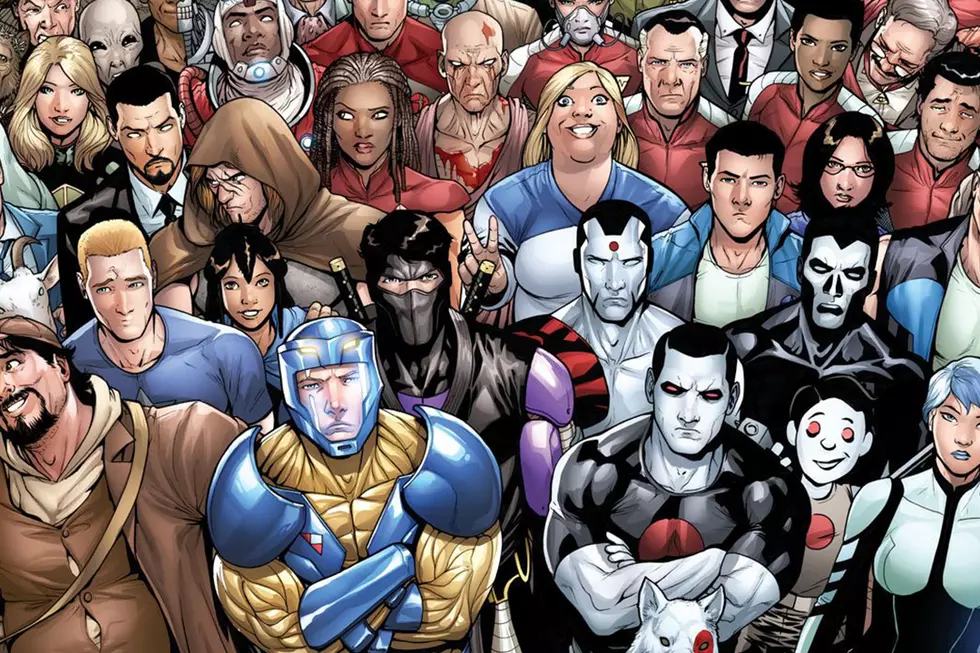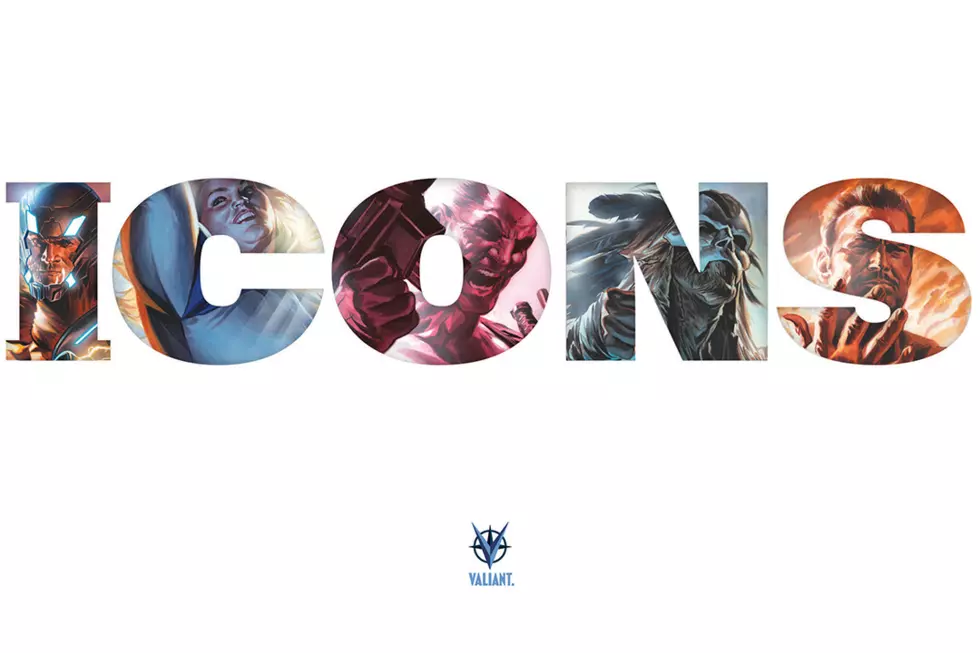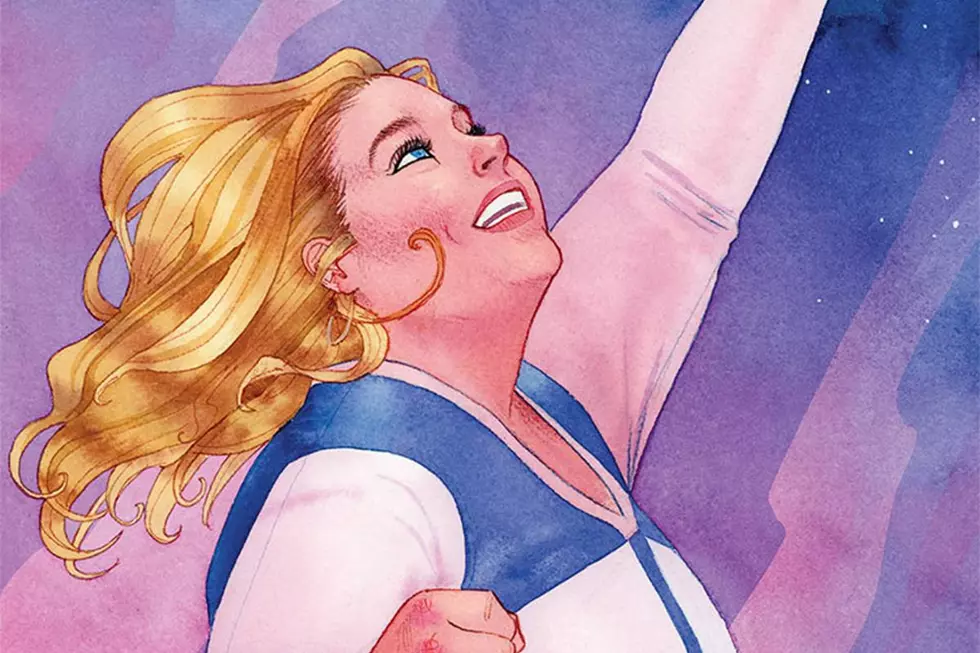
The Delinquents: A Beginner’s Guide to ‘Bloodshot’ and ‘Harbinger Wars’
Valiant Comics‘ shared superhero universe is smaller and less familiar than those of its major rivals, but even a small shared universe can offer a lot to learn about. To help those readers looking to take the plunge into the Valiant Universe, we’ve assembled our own team of delinquents to break things down. Steve Morris knows Valiant inside out; J.A. Micheline is new to the universe. Micheline has the questions, and Morris has the answers.
Last time, JAM was champing at the bit to talk about Harbinger, one of the flagship titles of the Valiant Universe. This time, she and Steve are back to finish out the Harbinger Wars and talk about Bloodshot, the Jason Bourne of the comics world!
Steve: Bloodshot is Valiant's war series, sort of, about a man who is brainwashed repeatedly and then even more repeatedly until he's turned into an ultimate assassin. With a powerful healing factor and no sense of self, Bloodshot is one of the army's most devastating --- and horrible --- weapons. It was written by Duane Swierczynski, with art by Manuel Garcia, Arturo Lozzi, and Ian Hannin. What did you make of his series?
JAM: This one I was much less into, really. I think the idea behind it --- really exploiting the fact that action films rely on wives and children as motivators for male heroes --- is clever, but the execution didn't thrill me. It's funny, because I expected to be invested in Jason-Bourne-in-comics-form over not-quite-the-X-Men, but it was absolutely the other way round.
What was lacking for me here was Bloodshot's identity. I had this same problem with Shadowman --- the problem of identity, I mean --- but what Shadowman had going for it was a relatively novel concept for a superhero. Bloodshot, on the other hand, is something that I've seen before. He's an archetype rather than a person.
Some of that certainly comes with the premise --- he himself is trying to find out who he is while also fending off attack after attack --- but I do think more could have been done to make him an individual. I mean, if we look at the Bourne films, even when we didn't know who Bourne was and even when we eventually understood that he was an assassin, he was always a person. One of the successes of the trilogy was the humanizing of the amnesiac assassin archetype. And it's a shame that Bloodshot couldn't quite pull off the same thing.
Steve: As you say, Bloodshot starts off with a completely blank slate, and the series is in spirit meant to be trying to slowly build in a personality as it goes along. The only question is if that personality is interesting enough to justify that slow burn.
What do you make of the visuals within the series? I think one thing which is striking is just how violent it is --- especially considering none of Valiant's other titles are ever really so bloody or visceral as that one.
JAM: I think the visual aspect of Bloodshot is what's most appealing. Garcia, Lozzi, and Hannin --- rightfully --- make the most of the gruesome situations that the character finds himself in, knowing that he will eventually grow it all back. It's the character's most unique feature and it's done unflinchingly. You see everything, muscle and bone --- it's grim and gross and I like it. I keep wanting to push it, to see how far the nanites can go. I'm always looking for the ugly consequence of a perceived gift and Bloodshot's is served up front and centre.
I know we've made the Jason Bourne comparison to Bloodshot and left X-Men to Harbinger, but I wonder if there's any truth to Bloodshot being a kind of gross Wolverine in that respect. They both have pasts they couldn't remember; they can both grow back from impossible injuries. But Wolverine's regeneration has always been relatively clean while Bloodshot’s is flat out terrifying.
And yet, interestingly, it's never played as something that's necessarily supposed to be terrifying or is even terrifying to others. I'm still mulling the purpose of that, but there's something I like about it. Mundane horror. Quotidian gore.
Steve: Did you get wrapped up at all in any of the political angle of the series? The idea that there's this great conspiracy working through the higher-up powers in the Valiant Universe, and Bloodshot is the man who might rise up against them one day?
JAM: Haha, is that what's meant to be happening? I thought Peter (from Harbinger) was the one who was meant to rain pain and terror down upon us all in the future, not Bloodshot.
Maybe this is part of the problem: I couldn't quite see his significance in the bigger picture beyond the fact that he's trying to find out who he is, which then leads him to get tangled up in Harada's business. I felt like I got a better sense of conspiracy and politics with Harbinger, really.
So, what is it that I missed, then?
Steve: I think there are quite a few blokes with the singular power to take down the Government within the Valiant Universe. But, what is it that you missed?
Well... nothing, to be frank.
I'm not here to recommend comics that aren't that interesting and Bloodshot is arguably the weakest of Valiant's main titles. You're missing a point in time when it becomes Bloodshot and the H.A.R.D. Corps, but the book never really progresses beyond the sort of stories you've now read. In fact, the current series, Bloodshot Reborn, is still working on giving the character a proper sense of personality, even now.
The main reason I asked you to give Bloodshot a try is because it leads into the first big crossover event that Valiant had since they relaunched: Harbinger Wars. It's co-written by the writer of Harbinger, Joshua Dysart and Duane Swierczynski, the writer of Bloodshot. The art is done by Clayton Henry, Pere Pérez, and Brian Reber.
Reading the first two volumes of both Bloodshot and Harbinger, did you start to feel yourself get involved and invested in the way they built up the story, ahead of time?
JAM: Yeah, you know, this is probably the most accessible an event has ever been for me. Admittedly, it's only a crossover between two books, but that's about the size I'd want a comics event to be. I understand the appeal of having massive, world-changing things that spill into every book, but more often than not, it's really messy and unsatisfying. Limiting it to two books makes it feel much more seamless. I felt pretty prepared to go into Harbinger Wars.
Because there were still a lot of moving pieces, I had to read carefully at times to understand character motivations, but overall, I think it was well handled. I'm particularly surprised and impressed by how easily we were introduced to the young team of psiots --- Valiant’s answer to Marvel’s mutants --- who are leading the kids. This is the first time we really see them and introducing that element while trying to execute a crossover was a risk, but it worked well. So well, in fact, that I was always a bit annoyed whenever we switched over from them to Bloodshot, despite having spent eight issues with him already.
In general, the psiots have grown me quite a lot.
Steve: I won't spoil the plotline of Harbinger Wars --- considering it's a crossover between two comics, most people reading this can probably assume what happens, at least to start with. But did the ending of the storyline make you at all interested to continue with Bloodshot? Or did you find, actually, you're happy to drop the book now? The series doesn't particularly have any sizeable impact on any of the other Valiant titles (well... one or two small crossovers, but nothing essential or game-changing) for the rest of the time it exists, so you could drop it at this point.
JAM: I'm pretty ready to drop it, to be honest. I think, even if I haven't loved most of the things you've introduced to me thus far, I've seen enormous potential in them. A different writer could make me love Shadowman and just a little more time with Doctor Mirage would likely push me into 'love' as well, but I don't see that option with Bloodshot. The core of the character is missing and I don't know how you'd fill it without taking him in a drastically different direction.
I had this problem with Joss Whedon's Dollhouse, too. It's hard to invest yourself in a character that lacks... character. In Dollhouse and Bloodshot both, the point is that the protagonists are constantly rewritten, but that's the very point that makes them difficult to connect with. With Dollhouse it at least bought an interesting premise for what was sacrificed, but I'm not sure what's been bought here.
Steve: Fair, to be honest. He's a blank slate who only really has trauma to define him (at this point, I hinted, teasing at stories to come) and when that's all you have going for you, it takes a hell of a lot to move you forward. I'd actually possibly compare him more to X-23 than Wolverine, though. She's a character who has a very similar origin to Bloodshot, albeit far more upsetting and horrific than anything Ray has had to deal with. And, as we move forward, we'll see other writers attempt to come in and deliver a personality for him, much as writers have done for X-23 over the last two or three years. To variable results.
Overall, what have you made of the Harbinger-and-Harbinger Wars side of this week's trawl through the Valiant Universe? Did Harbinger Wars pay off on all the setup that we've seen over the first two trades-worth of stories? And do you think you'd continue reading Harbinger, onto whatever comes next?
JAM: I'm not sure that Harbinger Wars totally paid off. Bloodshot made it drag and then the sense of the stakes was a bit messy. It's hard to worry that Bloodshot is going to kill the Harbinger team when I, the reader, know he won't. I probably latched onto the teenaged psiots quickly because the stakes were clear and it was easy to have compassion for their situation. Still, the goodwill earned from the second volume of Harbinger was what carried me through most of the event. Even though I'm ready to drop Bloodshot, I'm completely on board to keep reading through to volume 3 of Harbinger and beyond.
Steve: Ace! Well, seeing as you're all geared up and ready to read more of Harbinger...I'm going to bring you to a complete crashing halt, actually. MWAHAHA!
Ahem.
We're now on the march towards Unity, an ongoing "event" series at Valiant which features many of the characters we've seen so far --- but also several others who we have not. Therefore, in order to keep us on track with that event, I'm not going to assign any more Harbinger to you for the time being --- although I'm sure we'll come back to it eventually!
JAM: Boooooooooooo.
Steve: Instead, what I want to do is focus on the character who launched the Valiant Universe as we see it now: X-O Manowar. He's an interesting one, make no mistake, and his series has continued on for several years now with writer Robert Venditti as a constant. We're going to take a look at the first arc, which shows how he came to be; and then the second arc, which will introduce him to yet another contender for "handsomest Valiant hunk"; Ninjak. Together, these are two of the most liked protagonists at Valiant, so I'll be interested to see what you make of them.
For next time, your reading suggestions are X-O Manowar #1-8 (although you can go to #14 if you'd like) and Ninjak #1-5!
JAM: Oh, man. Ninjak. Well, all right! Here we go!
To Be Continued...
If you want to read along with our Delinquents, check out X-O Manowar, Vol 1 and 2, as well as Ninjak Vol 1, and join us back here in two weeks time!
More From ComicsAlliance



![It’s High Steaks Action In ‘The Black Hood: Season Two’ #3 [Exclusive]](http://townsquare.media/site/622/files/2017/02/BlackHood00.jpg?w=980&q=75)


![Bloodshot Takes On Bloodshot (Sort Of) In ‘Divinity III: Komandar Bloodshot’ #1 [Preview]](http://townsquare.media/site/622/files/2016/12/Bloodshot001.jpg?w=980&q=75)


